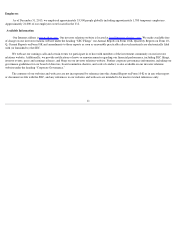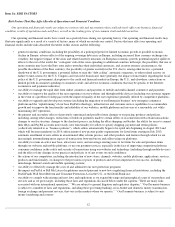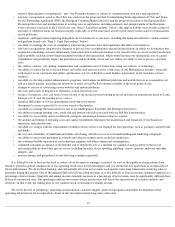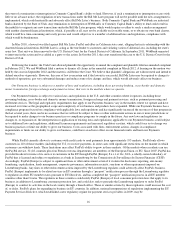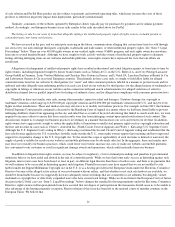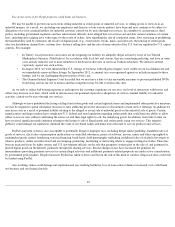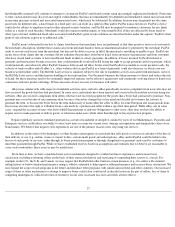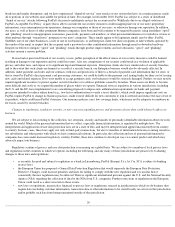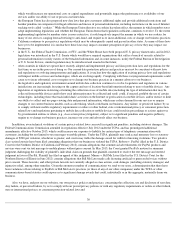eBay 2013 Annual Report Download - page 23
Download and view the complete annual report
Please find page 23 of the 2013 eBay annual report below. You can navigate through the pages in the report by either clicking on the pages listed below, or by using the keyword search tool below to find specific information within the annual report.
of-sale solution and PayPal Here product are also subject to payment card network operating rules, which may increase the costs of those
products or otherwise negatively impact their deployment, particularly internationally.
Similarly, consumers of the websites operated by Enterprise clients typically pay for purchases by payment card or similar payment
method. Accordingly, our Enterprise business faces risks similar to the risks described above for PayPal.
The listing or sale by our users of items that allegedly infringe the intellectual property rights of rights owners, included pirated or
counterfeit items, may harm our business.
We have received in the past, and we anticipate receiving in the future, communications alleging that certain items listed or sold through
our services by our users infringe third-party copyrights, trademarks and trade names, or other intellectual property rights. See “Item 3: Legal
Proceedings” below. There are over 40,000 rights owners in our verified rights owner (VeRO) program, and each rights owner has anywhere
from one to several hundred brands. Although we have sought to work actively with the owners of intellectual property rights to eliminate
listings offering infringing items on our websites and mobile platforms, some rights owners have expressed the view that our efforts are
insufficient.
Allegations of infringement of intellectual property rights have resulted in threatened and actual litigation against us from time to time by
rights owners, including litigation brought by luxury brand owners such as Tiffany & Co. in the U.S.; Rolex S.A. and Coty Prestige Lancaster
Group GmbH in Germany; Louis Vuitton Malletier and Christian Dior Couture in France; and L'Oréal SA, Lancôme Parfums et Beauté & Cie
and Laboratoire Garnier & Cie in several European countries. The plaintiffs in these cases seek, or sought, to hold eBay liable for alleged
counterfeit items listed on our websites by third parties; for “tester” and other consumer products labeled in a manner to prevent resale and for
unboxed and other allegedly nonconforming products in each case listed on our websites by third parties; for the alleged misuse of trademarks or
copyrights in listings or otherwise on our websites and in connection with paid search advertisements; for alleged violations of selective
distribution channel laws or parallel import laws for listings of authentic items; and for alleged non-compliance with consumer protection laws.
Plaintiffs in these and similar suits seek, among other remedies, injunctive relief and damages. Statutory damages for copyright or
trademark violations could range up to $150,000 per copyright violation and $2,000,000 per trademark violation in the U.S., and may be even
higher in other jurisdictions. These and similar suits may also force us to modify our business practices. For example, in June 2013, the German
Federal Supreme Court partially confirmed a decision by the Hamburg Court of Appeal in a matter where we had been found liable to prevent
infringing children's chairs from appearing on the site, and ruled that as a result of keyword advertising that linked to search result lists, we were
required to increase efforts to ensure that those search results were free from infringing content upon initial notification of such content. This
decision may require us to change our business practices in Germany in a manner that increases our costs and lowers our revenue. In addition,
rights owners have aggressively sought to reduce the applicability of limitations to intellectual property rights such as copyright exhaustion and
the first sale doctrine in cases such as Vernor v. Autodesk Inc. (Ninth Circuit Court of Appeals) and Wiley v. Kirtsaeng (U.S. Supreme Court).
Although the U.S. Supreme Court's ruling in Wiley v. Kirtsaeng overturned the Second Circuit Court of Appeals' ruling and established that the
first sale doctrine applies in the U.S. to products lawfully made outside the U.S., some rights owners oppose that reasoning and have expressed
support for a legislative change to the U.S. Copyright Act. To the extent the scope or applicability of such doctrines is limited or narrowed, the
supply of goods available for resale on our websites and mobile platforms may be adversely affected. In the aggregate, these and similar suits
may force us to modify our business practices, which could lower our revenue, increase our costs or make our websites and mobile platforms
less convenient to our customers or result in significant damage awards and injunctions, which could materially harm our business.
In addition to litigation from rights owners, we may be subject to regulatory, civil or criminal proceedings and penalties if governmental
authorities believe we have aided and abetted in the sale of counterfeit goods. While we have had some early success in defending against such
litigation, more recent cases have been based, at least in part, on different legal theories than those of earlier cases, and there is no guarantee that
we will continue to be successful in defending against such litigation. Plaintiffs in recent cases have argued that we are not entitled to safe
harbors under the Digital Millennium Copyright Act in the U.S. or as a hosting provider in the European Union under the Electronic Commerce
Directive because of the alleged active nature of our involvement with our sellers, and that whether or not such safe harbors are available, we
should be found liable because we supposedly have not adequately removed listings that are counterfeit or are authentic but allegedly violate
trademark or copyright law or effectively suspended users who have created such listings. While we do not believe the European Court of Justice
decision in the L'Oréal case (see “Item 3: Legal Proceedings”
below) changes the standard for hosting immunity under the Electronic Commerce
Directive, rights owners in European jurisdictions have asserted that our degree of participation in the transaction should cause us to be unable to
take advantage of the hosting immunity exception. Final resolution of this issue has been left to the national courts of member countries in the
European Union. We believe that
21


